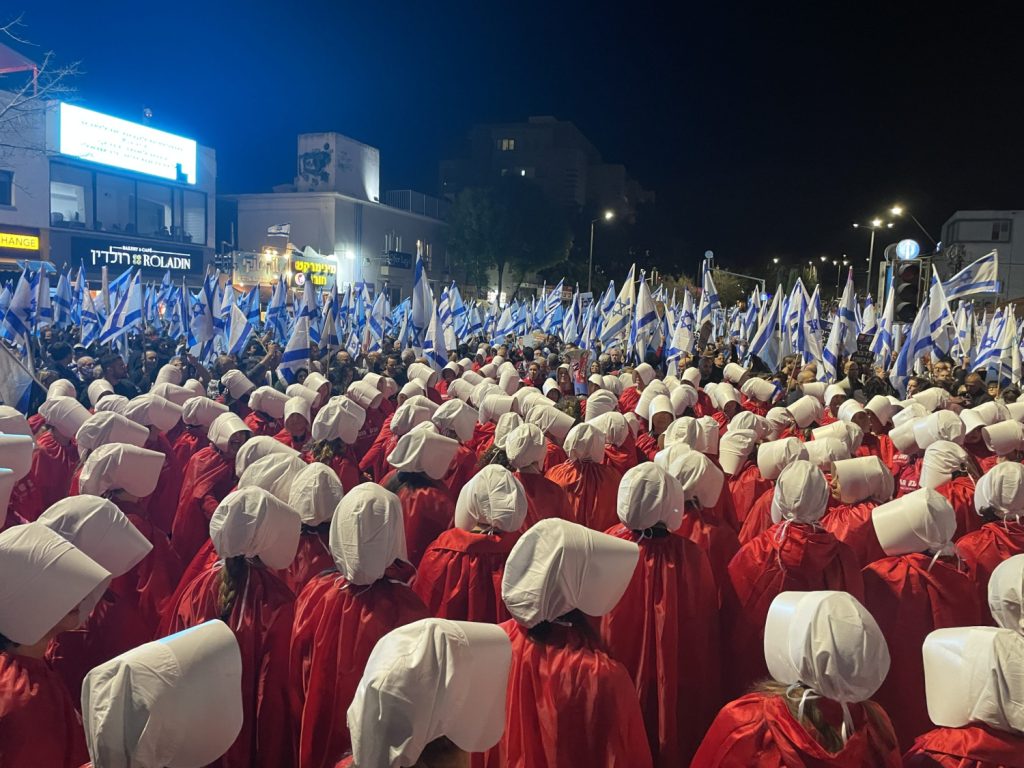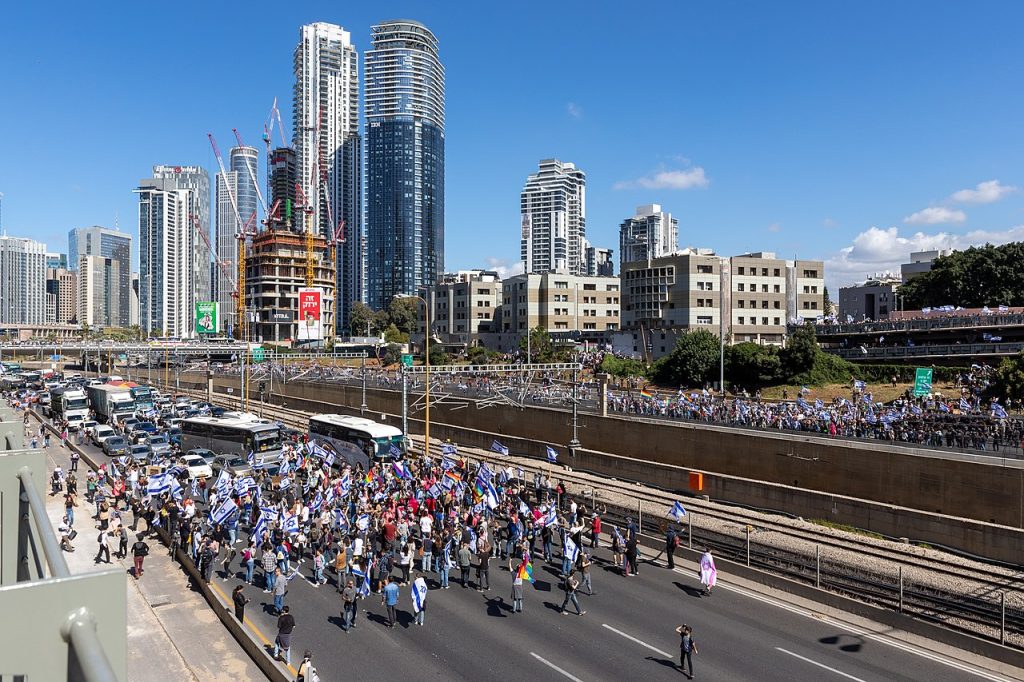Australia/Israel Review, Featured
Reaching a crescendo
Mar 27, 2023 | Amotz Asa-El

Now what for Israel’s judicial mayhem?
With the Israel Philharmonic behind him and more than 2,000 concertgoers in front of him, conductor Lahav Shani told the audience, “We will soon play all the music we have prepared for you,” but before that, he spoke several lines that were not part of the repertoire.
“We are anxious about the future of our state,” said the 34-year-old maestro to the audience’s applause, and went on: “Our democracy is a miracle, the cultural life we have built here is a miracle, and we should by no means lose what we have built.” And after, he added “I hope we quickly find a solution and unity,” the 50 musicians on stage began playing the national anthem, with the crowd rising and joining spontaneously in what sounded like a mixture of prayer, protest and hope.
It was but a sliver of what has been unfolding in Israel over recent weeks – the most extensive protest movement the Jewish state has ever seen.
Fearing that the Government’s plan to overhaul the judicial system is a gateway to autocracy or “illiberal democracy”, hundreds of thousands of Israelis have been taking to the streets for 11 straight weeks, as of this writing. Centred in Tel Aviv, but spread over more than 50 locations nationwide, the weekly rallies’ attendances have been growing steadily and recently exceeded 250,000, according to Channel 13 TV.
The demonstrators carry Israeli flags, thus creating blue-and-white forestations that transmit the protest movement’s first message, which is that its motivation is patriotic, and thus the opposite of the nihilism with which some cabinet ministers have tried to associate it.
The protests’ organisers are avoiding breaking the law, but some demonstrators have tried spontaneously to block traffic on Tel Aviv’s main artery, the Ayalon Highway. In one case, police stopped and arrested an angry anti-protest driver who appeared to be intending to drive at high speed into the protestors on the highway.

Most protests have been law-abiding, but there have been repeated attempts to block Tel Aviv’s Ayalon Highway (Image: Wikimedia Commons)
While friction builds on the streets, the protest has been joined by broad swathes of Israel’s economic, cultural and academic elites, as well as pillars of the defence establishment.
Protestations like maestro Shani’s have been joined by novelists, playwrights, and performers. Some, like singers Hava Alberstein and Aviv Gefen and author Etgar Keret, showed up at the street rallies carrying signs they made themselves, like Gefen’s “maybe it’s all over,” a line from a famous Hebrew song.
Warnings by more than 200 economists, including Nobel laureates and former governors of the Bank of Israel, that the reform might spark capital flight, were underscored by current Governor Prof Amir Yaron. In an interview with CNN, he termed the Government’s move “hasty,” and said it lacks the broad agreement it requires, and might discourage foreign investors and also cause a brain drain.
Even more ominously, Nadav Argaman, a former head of Shin Bet, Israel’s internal security agency, said the reform might destroy Israel. “The car is racing to the abyss,” he warned in an extensive interview on Channel 12 TV, “Bibi (Netanyahu) is the navigator and the way has been lost.”
Argaman, who headed the secret service for seven years – all under Netanyahu, who also appointed him – said he feared for Israel’s social cohesion. “If these laws pass Israel might arrive at the brink of dictatorship,” he said, and people in the military, the Shin Bet, and the Mossad spy agency “might conclude a dictatorship is evolving” and thus “choose to leave their organisations.”
Days after the interview, 180 reservist pilots and navigators, all civilians who give the air force one workday every week, reportedly told their units they would not show up for the upcoming week’s training session. So did 650 cyber warriors and other special operations officers.
Argaman’s first-ever interview was followed by an even more improbable public statement by Brig-Gen. (res.) Zeev Snir, who headed the Israel Atomic Energy Committee which oversees Israel’s nuclear activity. Snir, who also served under Netanyahu and was his appointee, had never spoken out publicly about anything.
Now, however, he told the mass-circulation Yediot Aharonot newspaper that the judicial reform is “a political coup” that destroys democracy’s checks and balances, and will turn Israel into “a Third World country.” Snir then also wrote a public letter to Netanyahu, warning his former boss that his Government’s “arrogance” is risking Israel’s very survival.
Snir and Argaman are but two of a vast collection of major figures who enlisted to fight the planned judicial overhaul, including retired Supreme Court justices, the CEOs of major banks, former chiefs of the IDF and the Mossad, and all ten living former commanders of the Israeli air force, from Amikam Norkin, 56, to Dan Tolkowski, 102.
Most of these people would be ready to accept a compromise formula that will allow constitutional legislation to be passed via a broad consensus. There have been several such formulas offered by assorted jurists, most notably one crafted by President Isaac Herzog, and presented by him in a dramatic televised address in which he warned of the danger of civil war, called any such violence “a red line”, and vowed: “I won’t let it happen.”
After having previously presented broad guidelines for negotiation on Feb. 12, which this column discussed last month, Herzog produced a detailed blueprint for a deal on March 15.
Considering the Israeli presidency’s largely ceremonial role, it was a highly unusual move, reflecting Herzog’s sense of alarm and frustration in the face of the failure of the political combatants to strike a deal.

Israeli President Herzog presented his compromise proposal on March 15
The Herzog roadmap includes, among others, proposals that judicial annulment of legislation will require the support of at least two-thirds of Supreme Court justices; that constitutional legislation will not be subject to judicial overrule, but will require the support of at least 80 of the Knesset’s 120 legislators, or 70 in two consecutively elected legislatures, to pass; that the Supreme Court justices’ effective veto power over the appointment of new justices will be removed; that ministerial appointments will not be subject to any “reasonableness” standard; that equality before the law and freedom of expression will be explicitly made constitutional rights (they are currently only “inferred” from other legislated rights); and that rulings by the attorney-general will continue to be binding.
Conspicuously missing from the presidential plan is any mention of the override clause, which in the Government’s plan would allow the Knesset to annul any court decision by a simple majority vote. Herzog also sought to appease ultra-Orthodox demands by suggesting that the Court will be forbidden from overriding legislation relating to deferring or cancelling the enlistment of ultra-Orthodox men in the IDF – the primary reason the ultra-Orthodox parties want the override clause in the first place is to prevent the Court from invalidating such legislation, as it has in the past.
On the day of March 15, after Herzog’s TV address was announced but before it was delivered, it was widely assumed that a deal of some sort had been struck, and the ordeal over the judicial reform proposals was coming to an end. Instead, hardly ten minutes after Herzog’s dramatic presentation of his proposal, Netanyahu flatly rejected it, saying it “perpetuated the existing situation.”

Herzog’s proposals were knocked back by PM Netanyahu and his government within the hour
Netanyahu’s main misgiving was reportedly that Herzog’s proposal does not grant the coalition an absolute majority on the committee that appoints judges.
Netanyahu’s game plan now is unclear. Some reports say he is eager to return the genie to the bottle and was ready to accept Herzog’s proposal, but faced a resignation threat from Justice Minister Yariv Levin – the judicial reform’s ideological mastermind and political godfather.
In any case, Netanyahu’s rejection of Herzog’s ideas quickly returned the masses to the streets, despite unseasonable rain. The demonstrators’ resolve underscored recognition among some Likud lawmakers that the reform plan must somehow change, lest events take a turn that everyone will regret.
One Likud lawmaker, Knesset Economics Committee Chairman David Bitan, called on Netanyahu to halt the reform legislation and seek dialogue over an alternative. Before that, Defence and Foreign Affairs Committee Chairman Yuli Edelstein chose to miss the plenary vote on the first reading of the reform package’s first piece of legislation. It was a clear message of displeasure with the direction of events. Even more meaningfully, there are reports that Defence Minister Yoav Gallant has privately told Netanyahu to seek compromise, suggesting he would not be able to continue in office if the PM did not.
As the plan’s elements approach their second and third readings, possibly before the Passover holiday which begins on April 5, the pair of dissenters might be joined by several others – and thus torpedo the whole judicial reform package. Yet such a scenario remains, for now, improbable.
A more likely scenario is that the Government will dilute and abridge its plan, in the hope of both assuaging its critics and saving face. The first such attempt came on March 19, when the Government said that, for the time being, it would only pass a law to allow the coalition to control the appointment of the successors to the next two retiring supreme court justices, and delay the rest of the package until later this year. The opposition immediately rejected these proposals, saying they were a trick designed to take the wind out of the protest movement.
Whichever way all this goes, as Israelis sit down for their Passover Seder meal, which celebrates ancient Israel’s liberation from slavery, millions of Israelis will likely be feeling that an unpredicted political storm has tarnished this festival of spring.
Tags: Israel






